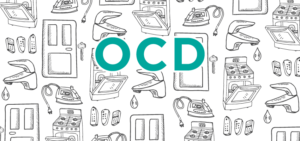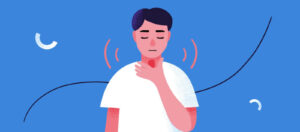It’s no secret that swallowing problems are on the rise. In fact, they’ve become so prevalent that they now have their own term: Obsessive Compulsive Swallowing. OCD for swallowing is a mental disorder characterized by recurrent and intrusive thoughts about food and swallowing. Individuals with OCD may experience these thoughts any time they are eating or drinking, as well as when they are not. OCD for swallowing can severely impact a person’s life, causing them to isolate themselves from social settings, lose sleep, and even try to harm themselves in order to avoid eating or drinking. If you or someone you know suffers from OCD for swallowing, please don’t hesitate to ask for help. We want to hear more about it.
Contents
What is OCD?

Obsessive-compulsive disorder, or OCD, is a mental disorder characterized by intrusive thoughts (obsessions) and repetitive behaviors (compulsions) that have no obvious benefits. These thoughts and behaviours can last for hours or days at a time, and can significantly interfere with daily life.
OCD often begins in early adulthood, but it can also develop at any point in life. Symptoms typically worsen during periods of stress or when the person is faced with a significant challenge, such as making a big presentation at work.
There is no one cause of OCD, but it appears to be related to abnormalities in the brain’s circuits that control mood and behaviour. Experts aren’t sure why these circuits become dysfunctional in people with OCD, but they believe that the disorder may be caused by a combination of genetic and environmental factors.
There is currently no cure for OCD, but treatments range from medication to psychotherapy. In most cases, symptoms gradually improve over time as the person learns how to manage them more effectively.
Can OCD cause swallowing problems?
 There are a few potential causes of swallowing problems in people with OCD, though no single cause is known for sure. One theory suggests that difficulties with swallowing may stem from an over-reliance on the imagination and worry over obsessions or compulsions. This can lead to tension in the neck and chest muscles, which can then affect how food moves down the throat.
There are a few potential causes of swallowing problems in people with OCD, though no single cause is known for sure. One theory suggests that difficulties with swallowing may stem from an over-reliance on the imagination and worry over obsessions or compulsions. This can lead to tension in the neck and chest muscles, which can then affect how food moves down the throat.
Other possible causes of swallowing problems in people with OCD include changes in tooth alignment or structure, impaired coordination, and nerve damage. If you’re experiencing difficulty swallowing and think it might be related to your OCD, talk to your doctor or mental health professional. They can help you figure out what’s causing the problem and recommend specific treatment options.
Which disorders can cause swallowing disorders?
 Swallowing disorders can be caused by a variety of disorders, including obsessive-compulsive disorder (OCD) and anxiety disorders. Some common causes of swallowing problems include:
Swallowing disorders can be caused by a variety of disorders, including obsessive-compulsive disorder (OCD) and anxiety disorders. Some common causes of swallowing problems include:
1. Swallowing problems due to OCD: People with OCD often have a fear of contamination or objects that could harm them. This fear can lead to Obsessive-Compulsive Swallowing Disorder, in which people experience difficulty swallowing because they are afraid the food will get stuck in their throat and cause them to become sick.
2. Swallowing problems due to anxiety: Anxiety can also cause swallowing problems. For example, people who are constantly worried about choking or getting sick may struggle to swallow food or liquids. This can lead to a condition called apnea, in which people lose consciousness for short periods of time while eating or drinking.
3. Swallowing problems due to tics: Tics are sudden movements or vocalizations that individuals with Tourette Syndrome often experience. These movements can interfere with normal breathing, which can lead to swallowing difficulties.
Can difficulty swallowing be caused by anxiety?
People with anxiety often experience difficulty swallowing, making it difficult to eat. Swallowing difficulties can be caused by a variety of factors, including anxiety and stress. Many people who have anxiety also struggle with poor breathing habits, which can lead to problems with swallowing. If you are experiencing difficulty swallowing, talk to your doctor about the possibility of having anxiety or stress-related problems. There are a number of treatments available that can help.
How to Treat OCD for Swallowing
OCD for swallowing can be a very debilitating disorder. People with OCD may experience intrusive thoughts or images about swallowing food, which can lead to an inability to resist eating or drinking even when they are in danger of hurting themselves. There are a few things that you can do to treat OCD for swallowing if it is affecting your quality of life.
One thing that you can do is seek out professional help. A mental health professional can help you cope with intrusive thoughts and provide guidance on ways to overcome any avoidance behaviours. They can also teach you coping mechanisms such as relaxation techniques and deep breathing exercises.
If seeking professional help is not an option, another thing that you can do is try self-help books or online resources. These resources may offer strategies such as exposure and response prevention (E&RP), which involves gradually increasing the amount of anxiety-provoking situations that you are exposed to until your anxiety decreases and the obsessions no longer occur.
How do I stop swallowing anxiety?
 If you or someone you know suffers from obsessive-compulsive disorder (OCD) related to swallowing, there are a few things you can do to ease your symptoms and improve your quality of life. Swallowing is one of the most common rituals that people with OCD engage in, which can create intense anxiety. However, there are ways to deal with this anxiety and improve your overall quality of life.
If you or someone you know suffers from obsessive-compulsive disorder (OCD) related to swallowing, there are a few things you can do to ease your symptoms and improve your quality of life. Swallowing is one of the most common rituals that people with OCD engage in, which can create intense anxiety. However, there are ways to deal with this anxiety and improve your overall quality of life.
The following are some tips on how to stop swallowing anxiety:
1. Understand why you’re swallowing anxiety-related thoughts and behaviours. Once you understand the root cause of your anxiety, you can start to address it directly. The first step is understanding what triggers your fears around swallowing. Are certain foods or drinks especially difficult for you to swallow? Do certain sounds make swallowing difficult? Once you identify the source of your anxiety, you can begin to work on identifying and addressing the underlying causes.
2. Practice relaxation techniques- This includes techniques like deep breathing and visualization exercises. Practising these techniques regularly will help reduce stress levels and allow for a more relaxed state when confronted with anxious situations around swallowing.
3. See a dentist- If your teeth or gums are causing significant pain when swallowing, see a dentist for an evaluation as soon as possible. Your dentist may be able to provide relief by correcting any problems early on before they become more serious and complicated later on down the road.
4. Consider medication- If none of the other solutions mentioned
Conclusion
If you or someone you know struggles with obsessive-compulsive swallowing, we would love to hear from you! OCD for Swallowing is a blog that discusses all things related to the disorder and encourages readers to share their experiences and advice. If you have any questions or want to chat about your experience with OCD for Swallowing, please feel free to leave a comment below or contact us through our contact form. Thank you for reading and we hope this article has helped shed some light on the topic.
For more information and guidance, please contact OCDMantra. OCD is a mental health disorder characterized by obsessions and compulsions. If you have any queries regarding OCD treatment, OCD Counseling, ERP therapy experienced therapists at OCDMantra can help: Book a trial OCD therapy session


